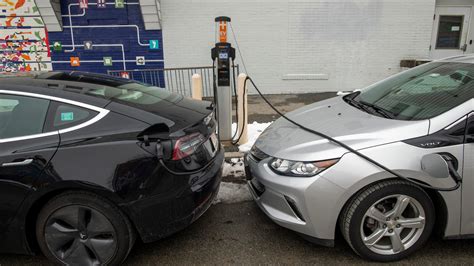The Commonwealth of Massachusetts has long been at the forefront of environmental sustainability initiatives in the United States. One of the most impactful efforts has been the implementation of the Electric Vehicle (EV) Rebate Program, aimed at encouraging the adoption of electric vehicles. This initiative has not only contributed to reducing greenhouse gas emissions but has also provided numerous economic and social benefits to residents. In this article, we will explore the advantages of the EV Rebate Program in Massachusetts, showcasing how it leads the charge towards a more sustainable future.
Understanding the Electric Vehicle Rebate Program
The Massachusetts Electric Vehicle Rebate Program, known as MOR-EV (Massachusetts Offers Rebates for Electric Vehicles), provides financial incentives to residents who purchase or lease eligible electric vehicles. The program is designed to reduce barriers to EV adoption by offsetting costs, making electric vehicles more accessible for average consumers. As of now, the program offers rebates of up to $2,500 depending on the vehicle’s battery capacity. In addition to these rebates, residents can benefit from federal tax credits as well, adding further financial incentives for making the switch to electric.
Environmental Benefits
One of the most compelling reasons to support the Massachusetts EV Rebate Program is its positive impact on the environment. Electric vehicles produce zero tailpipe emissions, which significantly improves air quality in urban areas. According to studies, reducing vehicles’ carbon footprint is critical in the fight against climate change. The EV Rebate Program aligns with Massachusetts’ comprehensive climate goals to reduce greenhouse gas emissions by 80% by 2050.
By encouraging more residents to switch to electric vehicles, the program plays a crucial role in reducing pollution levels. In a state known for its beautiful landscapes and diverse ecosystems, protecting air and water quality is paramount. The decreased reliance on fossil fuels not only benefits human health but protects wildlife habitats that may be affected by traditional car emissions.
Economic Advantages
Beyond environmental benefits, the EV Rebate Program also has significant economic implications for the state and its residents. The adoption of electric vehicles can result in considerable savings on fuel costs. Electricity is generally cheaper than gasoline, which can lead to substantial savings for drivers over time. Additionally, many EVs require less maintenance than their gasoline counterparts, as they have fewer moving parts and do not require oil changes.
The program stimulates local job creation as well. Greater adoption of electric vehicles encourages investment in EV-specific infrastructures, such as charging stations. This, in turn, creates jobs in installation, maintenance, and manufacturing, bolstering the local economy. Furthermore, Massachusetts is investing in renewable energy sources, which not only supports electric vehicle infrastructure but also promotes energy independence and sustainability.
Technological Advancements
The push for electric vehicles can drive innovation in the automotive industry. Massachusetts is home to numerous research institutions and universities, making it a hotbed for technological advancements, particularly in green technologies and batteries. By promoting electric vehicles, the state encourages research and development, potentially leading to breakthroughs in vehicle performance and energy storage systems. These advancements can increase the efficiency of EVs and reduce costs over time, emphasizing the program’s role in future-proofing the automotive sector.
Community Engagement and Education
The Massachusetts EV Rebate Program also serves as a catalyst for community engagement and education. With increasing interest in electric vehicles, various workshops, informational sessions, and community events are organized to educate the public about EV technology, its benefits, and the rebates available. Such efforts foster a community spirit focused on sustainability and collective responsibility, encouraging more residents to consider electric vehicles.
Conclusion
Massachusetts’ Electric Vehicle Rebate Program is a prime example of how state initiatives can drive positive change on multiple fronts. By providing financial incentives, promoting environmental sustainability, and stimulating the economy, this program represents the forward-thinking approach needed to tackle current and future challenges. As more residents embrace electric vehicles, the state moves closer to its ambitious climate goals, paving the way for a cleaner and healthier future.
FAQs
What is the MOR-EV program?
The MOR-EV program is the Massachusetts Offers Rebates for Electric Vehicles program aimed at encouraging residents to purchase or lease electric vehicles by providing financial rebates.
How much rebate can I receive from the program?
Eligible residents can receive rebates of up to $2,500, depending on the battery capacity of the electric vehicle.
Are there any additional incentives available for electric vehicle owners?
Yes, EV owners may also qualify for federal tax credits, further enhancing the financial benefits of switching to electric vehicles.
What types of vehicles are eligible for the rebate program?
Eligible vehicles include battery electric vehicles (BEVs) and plug-in hybrid electric vehicles (PHEVs) that meet specific criteria set by the state.
How can I apply for the rebate?
Applications for the rebate can be submitted online through the MOR-EV website after purchasing or leasing an eligible vehicle. Be sure to have all necessary documentation ready for a smooth application process.
This HTML format is suitable for use in a WordPress article, with headings, paragraphs, and FAQ sections clearly defined. Adjust as necessary for your specific WordPress theme or styling preferences!
Download Mass Electric Vehicle Rebate
